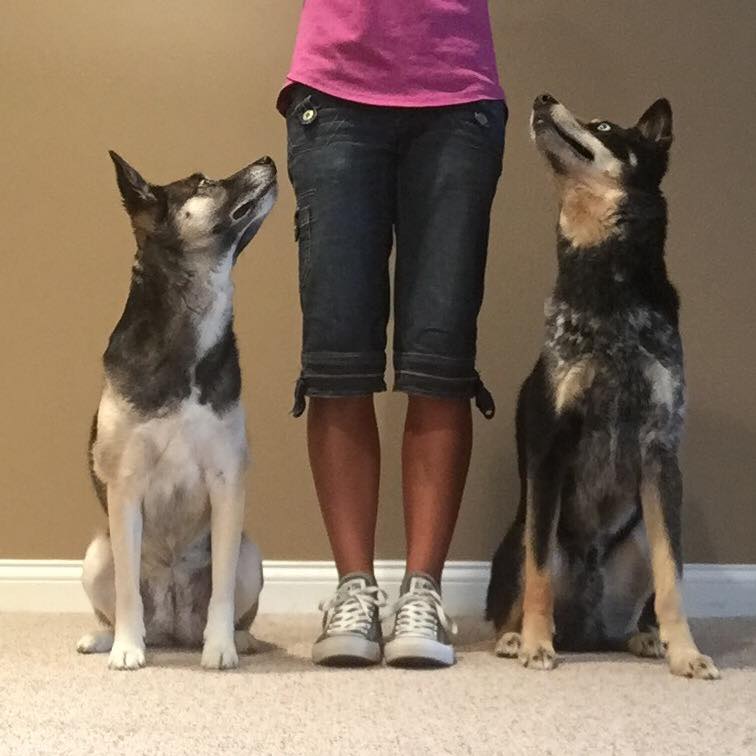I need my dog to see me as the alpha...
I need my dog to see me as dominant...
I need my dog to see me as the pack leader...
I need my dog to see me as the boss...
I need my dog to see me as in charge...
My response to those comments is always the same:
I don't need my dogs to see me as any of those things.
You can imagine that my response can get a lot of reactions--and not always the good kind. I get asked a lot about how I can train a dog without showing her I am the dominant pack leader. How can I make a dog behave if they don't know I am in charge? How can I not want to be a pack leader? I tell them it is actually not too complicated.
I didn't get dogs to prove I was "top dog." In terms of wanting to be seen as in charge, there is really no need to try to prove anything there. I have opposable thumbs and I can open the dog food container. As far as my dogs are concerned, I am a wizard. I can do algebra (sometimes), think abstractly and read classic literature. I am already ahead of the game there, too.
I am the bearer of all good things. Walks, toys, play, food, treats, snuggles, pets, a queen sized bed--all of it. And, as a result, my dogs look to me and see me as a pretty amazing person. And as a result of that, they will work for me, listen to me and we live together in harmony. It is pretty great.
At no time in my relationship with my dogs have I ever felt the need to exert dominance over them. Pushing them around or forcing them to do things doesn't prove that I am a pack leader. It doesn't show them I shouldn't be trifled with. In fact, it doesn't really prove anything. Except maybe that they should fear me.
And that isn't the type of leader I want to be.
So, how did I do I manage to get my dogs to listen without showing them who is boss or intimidating them?
We learned how to communicate. I watched them. I listened to them (dogs tell us a lot of things--we just have to learn how to listen). I never forced them to go faster, farther or longer than they were comfortable. When they said "I have had enough," we stopped. They learned to trust me. I showed them what I liked. They did it. I reinforced it, they realized what behavior worked, so they started to do it more often.
And they look at me like this:
My dogs see me as the most amazing person on earth because every good thing that have gotten has come from me. As a result of that, my dogs will do what I ask them to. And on the rare occasion they don't listen, I don't need to yell, scream or pin them down to show them they need to listen. All I need to do is withhold reinforcement (praise, food, play) and they realize that they didn't do what I asked. And you know what? They do it the next time.
Leadership isn't about winning--leadership is about building a team and growing together.
Since I am not concerned with being the dominant one, does this mean that my dogs get away with everything and my house is chaos? Of course not. If you were to watch the day to day around here, it is pretty routine. They wait patiently for food (while sometimes singing for their supper), they come in when asked, they snooze on the couch when I need to do some work or when I am watching TV, they wait to be let in and out of the car, they listen on walks. As I sit here typing this, Gracie is snoozing in her bed in my office and Garmin is watching the world go by out my office window.
My dogs aren't perfect (I tell clients that all the time, so it isn't a secret), but our relationship and understanding of each other is close to perfect. And that took time. But I regret nothing. And because they trust me, they take risks in training, they aren't afraid to make mistakes and we learn from them together. And we all grow stronger.
That's it. That's my big secret--I listen to dogs, build a relationship based on trust, set dogs up for success and then reward them for it, thus reinforcing good behavior.
So, the question remains: Should you be a leader?
Sure. But be the kind of leader that someone would want to follow. I want a dog that wants to work with you because it is fun and worthwhile and he wants to follow you. A dog who knows that if you are leading him too far from where he's comfortable, he can tell you to stop without fear. I don't want a dog who works with you because he is afraid of what will happen if he doesn't.
This week, instead of worrying about being dominant or showing your dog that you are the alpha pack leader, start thinking about the qualities you want to see in a leader. What would make you want to follow someone and work for them? Is it yelling, intimidation or fear? Or is it cooperation, mutual respect and understanding?
In training, build the relationship first. The behaviors will follow. And if you stop focusing on proving your dominant position and start focusing on building a strong, lasting relationship, you will be amazed at what happens next.
Until next time, Happy Training!

 RSS Feed
RSS Feed
